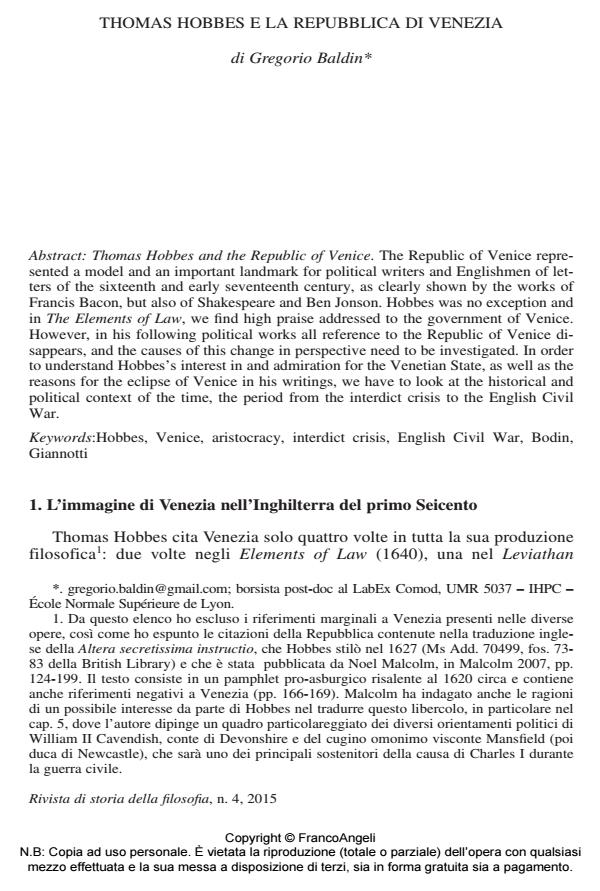Thomas Hobbes and the Republic of Venice
Journal title RIVISTA DI STORIA DELLA FILOSOFIA
Author/s Gregorio Baldin
Publishing Year 2015 Issue 2015/4
Language Italian Pages 25 P. 717-741 File size 599 KB
DOI 10.3280/SF2015-004002
DOI is like a bar code for intellectual property: to have more infomation
click here
Below, you can see the article first page
If you want to buy this article in PDF format, you can do it, following the instructions to buy download credits

FrancoAngeli is member of Publishers International Linking Association, Inc (PILA), a not-for-profit association which run the CrossRef service enabling links to and from online scholarly content.
The Republic of Venice represented a model and an important landmark for political writers and Englishmen of letters of the sixteenth and early seventeenth century, as clearly shown by the works of Francis Bacon, but also of Shakespeare and Ben Jonson. Hobbes was no exception and in The Elements of Law, we find high praise addressed to the government of Venice. However, in his following political works all reference to the Republic of Venice disappears, and the causes of this change in perspective need to be investigated. In order to understand Hobbes’s interest in and admiration for the Venetian State, as well as the reasons for the eclipse of Venice in his writings, we have to look at the historical and political context of the time, the period from the interdict crisis to the English Civil War.
Keywords: Hobbes, Venice, aristocracy, interdict crisis, English Civil War, Bodin, Giannotti
- Hobbes and Galileo: Method, Matter and the Science of Motion Gregorio Baldin, pp.153 (ISBN:978-3-030-41413-9)
- Francis Bacon's Concept of spiritus and Thomas Hobbes Gregorio Baldin, in RIVISTA DI STORIA DELLA FILOSOFIA 3/2019 pp.401
DOI: 10.3280/SF2019-003001 - British Modern International Thought in the Making Mikko Jakonen, pp.45 (ISBN:978-3-031-45712-8)
Gregorio Baldin, Thomas Hobbes e la Repubblica di Venezia in "RIVISTA DI STORIA DELLA FILOSOFIA" 4/2015, pp 717-741, DOI: 10.3280/SF2015-004002